John Hurrell – 23 April, 2013
This ambiguous picture could have been a statement about the role of the painter, hinting at melancholy, persecution, and humiliation. Outside of any wild interpretation or paranoid storytelling, it visually satisfied with three varieties of blue playing off against the strident orange, and mixed alignment of various organic shapes cleverly repeated.
AUT painting lecturer Ian Jervis recently presented five oil paintings at RM on K’ Rd: four moderately sized, secondary coloured, square works on stretchers, and one very small, tertiary coloured, rectangular item cut out and trimmed from a larger piece of loose canvas and placed flat on the wall.
The contrast between the two types was striking. It wasn’t just a matter of size, support and ratio. One used thin paint, finely brushed on or scrapped back with a palette knife; the other featured more viscous paint, turbulently applied with agitated traces of brush head and bristle. One was buoyant in mood, with harsh complementary juxtapositions. The other was darker, greyer and more ominous, with ‘muddier’ more nuanced colour mixing.
These were semi-abstract works that alluded to narrative - with symbolist elements thrown in. There was a sense that they had evolved from a process where shapes, colours and semantics were tested out, and restlessly shuffled around until resolution was arrived at. Or else with the small piece of painted canvas, composed by subtracting undesirable sections. They were not preplanned before execution, for in some, alluring vestiges of earlier variations appeared tucked under the edges of final forms.
The small work and one of the larger pieces referenced landscape forms and the sea, but the others had a very different quality and were, I think, much stronger. One, dominated by a central eyeball with two pupils, seemed to reference the Orphism of Sonia Delaunay and the Symbolist lithographs of Odilon Redon. The presence of a small adjacent cross-haired rifesight introduced a menacing tension.
Another painting, full of writhing, entangled, snakelike forms, possibly alluded to the story of the Trojan priest Laocoon, and his two sons, being strangled by sea serpents sent by Poseidon. Another still had a sleeping giant nestled into some hills, the faint outline of a stick figure walking in front of him.
In Jervis’s show the most engrossing work was - if one wanted a narrative with which to imaginatively interpret - a mysterious image of cascading orange tears and flickering blue flames. In the midst of this strange (almost solarised) conflagration was a vague figure wearing a beret. Hanging from its neck was a yellow coathanger, perhaps a sign for invisibility.
This ambiguous picture could have been a statement about the role of the painter, hinting at melancholy, persecution, and humiliation. Outside of any wild interpretation or paranoid storytelling, it visually satisfied with three varieties of blue playing off against the strident orange, and mixed alignment of various organic shapes cleverly repeated in an abruptly shifting space.
Within the exhibition there were sporadically reoccurring shapes and motifs that connected the individual canvases, bridging gaps within the sequence so that continuity was maintained as you moved around the room. The four square paintings invited special speculation - often along Symbolist lines - attracting your interest and mentally drawing you in. The fifth very small work made you wonder what Jervis had thrown away, how big the canvas was initially when he started, and why he arrived at the saveable portion that he did. Very different from the others. A different process.
John Hurrell
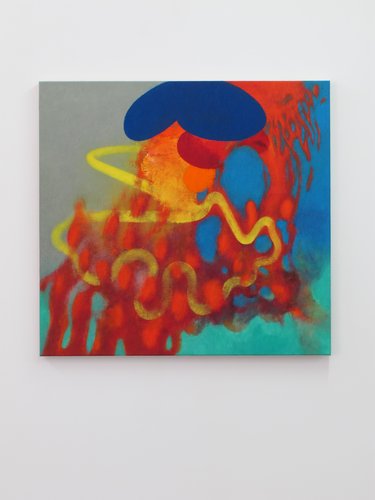
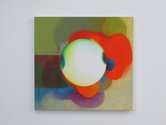
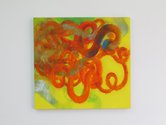

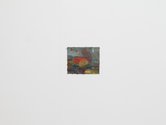
 Two Rooms presents a program of residencies and projects
Two Rooms presents a program of residencies and projects Advertising in this column
Advertising in this column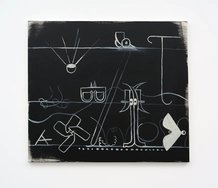
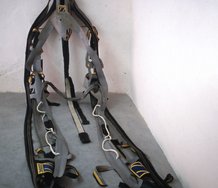
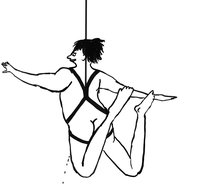
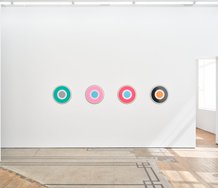
This Discussion has 0 comments.
Comment
Participate
Register to Participate.
Sign in
Sign in to an existing account.